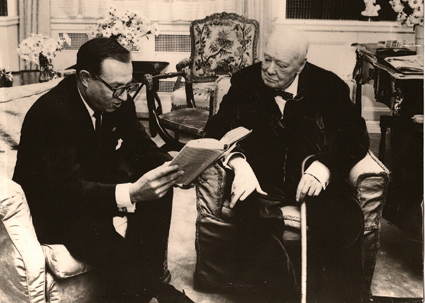Saturday April 15, 2017
Winston Churchill, Comsymp
Near the end of “High Noon: The Hollywood Blacklist and the Making of an American Classic,” the much-recommended new non-fiction book by Glenn Frankel, we get a bit of blacklisted screenwriter Carl Foreman's life in exile in London. Some bad stuff: He suffered writer's block, drank too much, slept around on his wife, felt angry all the time. He did do a few pictures for Columbia under a pseudonym, then became one of the first, if not the first, blacklisted writer to work openly again without having to name names before HUAC. He wrote and produced the lackluster “The Key,” starring William Holden and Sophia Loren in 1958, then struck it big by writing and producing “The Guns of Navarone” with Gregory Peck, Anthony Quinn and David Niven.
One of the fans of “Navarone” was Winston Churchill, then 88, who set up a meeting with Foreman at his office to discuss the possibility of Foreman writing the movie adapatation of his memoir, “My Early Life: A Roving Commission.” (It finally became a movie in 1972, seven years after Churchill's death.) “In the interest of full disclosure,” Frankel writes, Foreman admitted to the former prime minister, and the man who had invented the term “The Iron Curtain,” that he had been blacklisted in the ‘50s for earlier Communist connections. This was Churchill’s reply:
“Oh, I know all about you,” Churchill said. “But we don't like political blacklists in England. And speaking for myself, I don't care what a man believed in when he was a boy. My concern is whether or not he can do the job.”

Carl Foreman with infamous fellow traveler Winston Churchill.
Baseball's Active Leaders, 2023
What Trump Said When About COVID
Recent Reviews
Everything Everywhere All at Once (2022)
Black Panther: Wakanda Forever (2022)
Doctor Strange in the Multiverse of Madness (2022)
Spider-Man: No Way Home (2021)
The Cagneys
A Midsummer Night's Dream (1935)
Something to Sing About (1937)
Angels with Dirty Faces (1938)
A Lion Is In the Streets (1953)
Man of a Thousand Faces (1957)
Never Steal Anything Small (1959)
Shake Hands With the Devil (1959)







